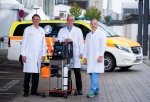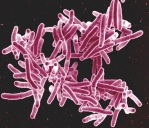-
The start of a transnational cooperation for a future of sustainable healthcare - 25/07/2024

The HACK-IT-NET (“Health And Care Knowledge and Innovation Transfer NETwork”) project aims to provide holistic and seamless healthcare for all patients in the Alpine region. The project, which was launched in July 2024 and will run for three years, aims to bring together stakeholders in the healthcare sector to create a forward-looking healthcare ecosystem in the Alpine region. BIOPRO is a partner.
https://www.bio-pro.de/en/information/press-release/biopro-sustainability-partner-eu-hack-it-net-project
-
Research association - 24/07/2024

Every person is unique – even when they are ill. This is why many approaches to personalised medicine have been under development. The Stuttgart Partnership Initiative - Mass Personalization (SPI-MP), which focuses on basic research into fabrication and biomaterial technologies for personalised biomedical systems, is at the heart of such research work. The projects range from artificial knee joint cartilage to state-of-the-art stroke diagnostics.
https://www.gesundheitsindustrie-bw.de/en/article/news/spi-mp-pioneer-personalised-medical-technology
-
-
-
-
-
-
-
-
-
Press release - 05/07/2024
With "OrgaPlexing", scientists at the MPI of Immunobiology and Epigenetics have developed a new method that shows how guardian cells of the immune system, the macrophages, orchestrate their cell structures during inflammation or bacterial infection, making it possible to observe the interactions between several organelles simultaneously and thus providing insights into cell metabolism and the production of inflammatory molecules.
https://www.gesundheitsindustrie-bw.de/en/article/press-release/symphony-organelles
-
-
-
-
-
-
-
-
-
-
Baden-Württemberg receives the EU Commission's "Regional Innovation Valley" label - 01/07/2024

The EU research project PRECISEU, which started in June 2024 and will run for five years, aims to connect innovation ecosystems across Europe and advance personalised medicine throughout Europe. BIOPRO Baden-Württemberg is one of 25 partner organisations from 11 European countries that are working on the further development of customised healthcare as part of the research project.
https://www.bio-pro.de/en/information/press-release/customised-healthcare-all-biopro-partner-eu-project-preciseu
-
-
Press release - 24/06/2024
Researchers at University of Galway, the Heidelberg Institute for Theoretical Studies (HITS) Heidelberg University, and Heidelberg University Hospital have created digital babies to better understand infants’ health in their critical first 180 days of life. The international team created computer models that simulate the unique metabolic processes of each baby. The models can help to better understand rare metabolic diseases.
https://www.gesundheitsindustrie-bw.de/en/article/press-release/digital-babies-created-improve-infant-healthcare
-
-
-
-
Gender-specific differences - 18/06/2024

Gender medicine is the study of gender-specific health differences. Many diseases manifest themselves differently in men and women and therapies do not always have the same effect depending on the sex of the patient being treated. There is currently not enough data on these differences. Research teams including the one led by Professor Dr. Dr. Sonja Loges from the University Medical Centre Mannheim and the DKFZ are seeking to change this.
https://www.gesundheitsindustrie-bw.de/en/article/news/gender-medicine-why-good-healthcare-not-matter-course-everyone
-
-
-
-
Press release - 13/06/2024
Printing a new cornea during an operation to restore a patient’s eyesight: This groundbreaking step in the fight against corneal disorders is set to become reality with a laser based process using personalized bioink. The method was developed by researchers at the Karlsruhe Institute of Technology (KIT) in collaboration with Carl Zeiss Meditec AG and Evonik Healthcare. Their project won the idea award in this year’s NEULAND innovation contest.
https://www.gesundheitsindustrie-bw.de/en/article/press-release/eyesight-3d-printer
-
-
-
-
-
-
-
-
-
-
-
-
-
-
Innovation in emergency medicine - 23/05/2024

Few people survive a cardiac arrest; blood stops flowing to the brain and other vital organs and the resulting lack of oxygen causes extensive damage to the body. In response to this, researchers at the University Medical Centre Freiburg and Resuscitec GmbH have developed CARL, an innovative resuscitation system, which – in addition to the oxygen level – adjusts numerous blood parameters to individual patient requirements. This greatly improves…
https://www.gesundheitsindustrie-bw.de/en/article/news/carl-pushes-back-boundaries-resuscitation-therapy
-
-
-
-
-
-
-
-
-
-
-
-
-
-
-
App for tuberculosis diagnosis - 15/05/2024

Globally, the majority of children with tuberculosis remain undiagnosed and therefore untreated because their symptoms are categorised incorrectly. Researchers at Heidelberg University Hospital want to develop an app that analyses medical information, risk factors and local surveillance data to calculate individual risk of infection and test those who might be affected with TB as early as possible.
https://www.gesundheitsindustrie-bw.de/en/article/news/find-tb-aims-improve-access-tuberculosis-diagnostics
-
-
-
-
-
-
-
-
-
-
-
-
-
-
Website address: https://www.biooekonomie-bw.de/en/search







